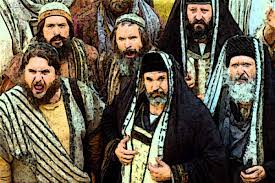Isra’el’s National Confession of Sin
63:7 to 64:12
One of the three purposes of the Great Tribulation is to break the stubbornness of the Jewish nation (Dani’el 11-12 and Ezeki’el 20:34-38). It is through the crucible of the Great Tribulation, the distress that it brings being compared to childbirth, that Isra’el will be brought to repentance. These verses contain Isra’el’s prayer at the end of the Great Tribulation that brings about the Second Coming of Christ. The actual words of this prayer are found in four key passages of Scripture, in Psalm 79, in Psalm 80, in Isaiah 53:1-9, and here.

The Jewish leadership rejected Christ. The rabbis taught that when Moses came down from Mt. Sinai he not only brought down the Written Law, or the Ten Commandments, but he also brought down the Oral Law (see the commentary on The Life of Christ, to see link click Ei – The Oral Law). Before the time of Christ the Oral Law was held to be equal, if not more important, than the Torah. Therefore, the rabbis taught that when the Messiah came, He would not only believe in the Oral Law, but would participate in the making of new Oral Laws. It was no surprise that for every one of the 613 Laws of Moses found in the Pentateuch, the Pharisees had made up 1,200 oral laws. That was the real reason they rejected Him. He had rejected their manmade Oral Law or the tradition of the elders (Matthew 15). But the professed reason they rejected Him was on the basis of being demon possessed. They could not deny His miracles. But they did not believe He was the Messiah. So the only conclusion they would come to was that He was demon possessed. So when the Pharisees, who came down from Jerusalem said: He is possessed by Beelzebub (Satan)! By the prince of demons He is driving out demons (Matthew 12:25; Mark 3:22; Luke 11:17-22 and John 7:20), the people also rejected Him.
The Jewish people had also rejected Messiah. When Yeshua was before Pontius Pilate, the Roman governor of Judea, it was his custom at the Passover to release a prisoner chosen by the crowd. At that time they had a notorious prisoner, called Barabbas. So when the crowd had gathered, Pilate asked them, “Which one do you want me to release to you: Barabbas, or Jesus who is called Christ? For Pilate knew it was out of envy that they had turned Yeshua over to him. But the chief priests and the elders persuaded the crowd to ask for Barabbas and to have Jesus executed. “Which one do you want me to release to you? asked the governor?” “Barabbas,” they answered. “What shall I do, then, with Jesus who is called Christ?” Pilate asked. They all answered, “Crucify Him!” “Why? What crime has He committed?” asked Pilate. But they shouted all the louder, “Crucify Him!” When Pilate saw that he was getting nowhere, but that instead an uproar was starting, he took water and washed his hands in front of the crowd. “I am innocent of this man’s blood,” he said, “It is your responsibility!” All the people answered, “Let His blood be on us and on our children.” Then Pilate released Barabbas to them. But he had Yeshua flogged, and handed Him over to be crucified (Matthew 27:15-26).
Therefore, both the Jewish leadership and the Jewish people of the first century rejected Messiah. But here we see the national confession of sin by the believing remnant. This is the second version of this prayer. We saw the first version in 53:1-9. Yeshua will not return again until He is asked to do so by the Jewish leadership and the believing remnant that are alive at the end of the Great Tribulation (also see the commentary on Revelation Ev – The Basis for the Second Coming of Jesus Christ). At that point the eight stage campaign of Armageddon will begin (see the commentary on Revelation Ex – The Eight Stage Campaign of Armageddon).
However, before we move on, there is a valuable lesson for us to learn. The Bible teaches that if we claim to be without sin, we deceive ourselves and the truth is not in us. But if we confess our sins, He is faithful and just and will forgive us our sins and purify us from all unrighteousness. How can this be so? Because the blood of Jesus, His Son, purifies us from all sin (First John 1:7b-9). This is what will happen at the end of the Great Tribulation with the nation of Isra’el. On that day when they confess their sin, a fountain will be opened to the house of David and the inhabitants of Jerusalem, to cleanse them from sin and impurity (Zechariah 13:1). And the same can happen to you today. Do you want a fountain of blessing to be opened to you and cleanse you from your sin and impurity? Just confess your sins to Him right now.



Leave A Comment